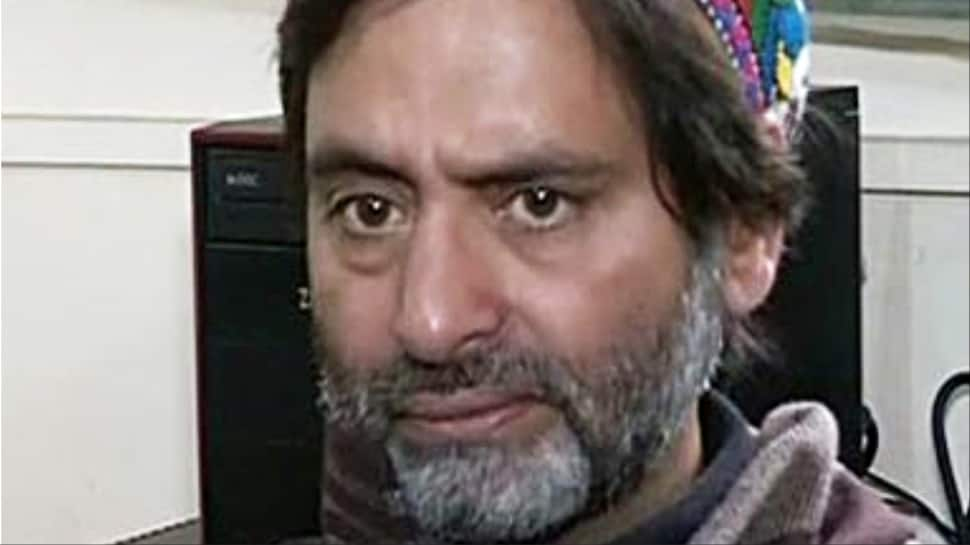 |
|
The Supreme Court of India is currently grappling with a complex legal case involving Yasin Malik, a Kashmiri separatist leader. The case centers around allegations of Malik's involvement in the killing of four Indian Air Force officers in Srinagar in 1990. The court's deliberations highlight a crucial intersection of justice, national security, and the fundamental rights of even those accused of heinous crimes. The central issue before the court is how to balance the need for a fair trial, guaranteed under Indian law, with the significant security concerns surrounding Malik's case. The CBI, appealing a lower court's order, argues that Malik's physical presence in Jammu for the trial poses unacceptable risks, both to the safety of witnesses and overall security. The Solicitor General emphasized Malik’s connections to known terrorist organizations, citing a photograph depicting Malik alongside Hafiz Saeed, the founder of Lashkar-e-Taiba. The Solicitor General argued that this connection, combined with past threats and the assassination of a witness, necessitates heightened security measures.
The Supreme Court's response highlights a key principle of jurisprudence: the right to a fair trial applies even to those accused of terrorism. Justice Abhay S. Oka's invocation of Ajmal Kasab's case serves as a potent example of this principle. Kasab, the sole surviving terrorist of the 2008 Mumbai attacks, received a full trial, despite the gravity of his crimes. This comparison underscores the court's commitment to upholding fundamental rights, even in the face of national security concerns. However, the court also recognizes the serious implications of the security concerns raised by the CBI. The assassination of a witness underscores the very real threats that are being considered. The court’s suggestion to explore holding the trial within the confines of the jail, or even utilizing virtual court appearances via video conference, suggests a pragmatism in addressing security issues while adhering to legal principles. These proposals balance maintaining the right to a fair trial while mitigating security risks.
The case of Yasin Malik is far from unique. It represents a common challenge faced by judicial systems worldwide: how to ensure justice while managing the practical realities of security threats. The dilemma extends beyond the immediate logistical considerations; it also highlights the broader philosophical debate about balancing individual rights with national security concerns. The judiciary’s careful weighing of the arguments presented by the CBI, which emphasized Malik’s past actions and high-profile status as reasons against a standard trial process, is critical in establishing a precedent for similar cases that will undoubtedly arise in the future. Striking a balance between these opposing forces requires a careful consideration of multiple perspectives. This case reveals the intricacies of applying the law in circumstances where national security is a pressing factor. The use of the photograph to illustrate Malik’s ties to terrorism serves as powerful evidence of the complexities of prosecuting such cases; such evidence is clearly relevant in the context of security, but its use also raises the question of whether such information might unfairly prejudice the jury.
The Supreme Court's adjournment of the hearing to allow the CBI to amend its petition and implead all accused persons demonstrates a methodical approach to ensuring a just and fair process for all involved. This move underscores the judicial commitment to procedural fairness, which is often as important as the final judgment itself. The inclusion of all accused persons signifies an effort to ensure that the case is considered holistically, without neglecting any relevant parties or perspectives. The court’s consideration of virtual hearings as a potential solution highlights the adaptation of legal processes to accommodate modern technology and security concerns. This adaptive approach suggests a recognition that the pursuit of justice needs to adapt to ever-changing circumstances and threats.
Ultimately, the Yasin Malik case serves as a crucial case study for legal scholars and policymakers alike. It forces a critical examination of the boundaries between justice, national security, and individual rights. The outcome will likely set a precedent for future cases involving similarly high-profile individuals accused of terrorism. The court’s decision will not only affect Malik's fate but also shape the ongoing discourse on balancing fundamental rights with the pressing needs of national security, specifically within the unique and often turbulent context of the Kashmir region. The ongoing debate highlights the ever-evolving challenges faced by judicial systems in the face of complex threats and a commitment to upholding the rule of law.
Source: 'Even Terrorist Like Ajmal Kasab Was Given Fair Trial': Top Court On Yasin Malik Case
